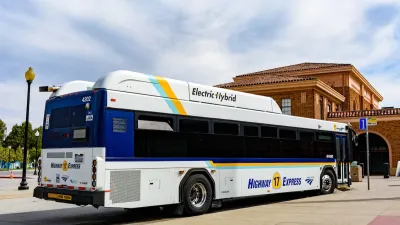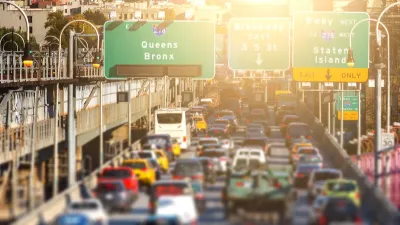In the first of two guest posts, UCLA researcher Eric A. Morris blogs on the logic behind congestion pricing.
"To many people, [congestion pricing] sounds like a scheme by mustache-twirling bureaucrats and their academic apologists to fleece drivers out of their hard-earned cash. Why should drivers have to pay to use roads their tax dollars have already paid for? Won't the remaining free roads be swamped as drivers are forced off the tolled roads? Won't the working-class and poor be the victims here, as the tolled routes turn into 'Lexus lanes'?"
"[Under the current system,] there's no free lunch; instead of paying with money, you pay with the effort and time needed to acquire the good. Think of Soviet shoppers spending their lives in endless queues to purchase artificially low-priced but exceedingly scarce goods. Then think of Americans who can fulfill nearly any consumerist fantasy quickly but at a monetary cost. Free but congested roads have left us shivering on the streets of Moscow."
"Using tolls to help internalize the congestion externality would somewhat reduce the number of trips made on the most congested roads at the peak usage periods; some trips would be moved to less congested times and routes, and others would be foregone entirely. This way we would cut down on the congestion costs we impose on each other."
Thanks to Franny Ritchie
FULL STORY: Why You’ll Love Paying for Roads That Used to Be Free: A Guest Post

Manufactured Crisis: Losing the Nation’s Largest Source of Unsubsidized Affordable Housing
Manufactured housing communities have long been an affordable housing option for millions of people living in the U.S., but that affordability is disappearing rapidly. How did we get here?

Americans May Be Stuck — But Why?
Americans are moving a lot less than they once did, and that is a problem. While Yoni Applebaum, in his highly-publicized article Stuck, gets the reasons badly wrong, it's still important to ask: why are we moving so much less than before?

Research Shows More Roads = More Driving
A national study shows, once again, that increasing road supply induces additional vehicle travel, particularly over the long run.

Judge Halts Enforcement of Anti-Homeless Laws in Grants Pass
The Oregon city will be barred from enforcing two ordinances that prosecute unhoused residents until it increases capacity and accessibility at designated camping sites.

Advancing Sustainability in Los Angeles County Schools
The Los Angeles County Office of Education’s Green Schools Symposium brings together educators, students, and experts to advance sustainability in schools through innovative design, climate resilience strategies, and collaborative learning.

Using Old Oil and Gas Wells for Green Energy Storage
Penn State researchers have found that repurposing abandoned oil and gas wells for geothermal-assisted compressed-air energy storage can boost efficiency, reduce environmental risks, and support clean energy and job transitions.
Urban Design for Planners 1: Software Tools
This six-course series explores essential urban design concepts using open source software and equips planners with the tools they need to participate fully in the urban design process.
Planning for Universal Design
Learn the tools for implementing Universal Design in planning regulations.
City of Moreno Valley
Institute for Housing and Urban Development Studies (IHS)
City of Grandview
Harvard GSD Executive Education
NYU Wagner Graduate School of Public Service
City of Cambridge, Maryland
Newport County Development Council: Connect Greater Newport





























